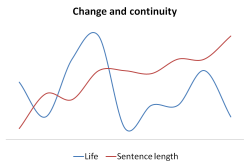One thing that is striking about the lives of those I have interviewed is how their lives are full of turn-arounds and moments where their offending comes to mean something different, or even stops for years. A few examples:
A woman who was addicted to drugs, in prison multiple time, but then managed to come off drugs with the help of a Drug Treatment and Testing Order. She stopped offending for some time, but after a traumatic rape started drinking heavily to manage her mental health problems. This led to further offences (breach of the peace, shoplifting, assaulting police) and further imprisonment.
A man who often had confrontations with the police when drunk, resulting in fairly constant prison sentences. After his late twenties he started calming down, but also found himself homeless at a time when much of the homeless accommodation in Glasgow had been shut down. Realising he was safer and more comfortable in prison than on the streets, he started to drink on purpose so that he’d have the courage he needed to seek confrontation with the police and return to prison. This strategy meant that he continued to be in and out of prison for a further ten years.
A man who had served several sentences and was addicted to drugs, but then met a woman and managed to ‘go straight’. Moving to a new area, they set up home together, had children, and he found a job that he was happy with and paid the bills. Several years went by before he accepted an offer of free drugs, relapsed into a habit (as did his partner) and started dealing drugs to fund this. Their children were taken into care and later adopted when Social Work found out, and he returned to prison several times after.
Several women who stopped taking drugs and offending when they found themselves pregnant and managed to sustain a crime- and drug-free lifestyle for several years while their child was young. Having social work contact from birth (due to their drug taking), though, meant that when they relapsed their child was taken away from them (often to go and live with family members), with little of no hope of them being returned. To cope with their sense of failure and missing their child these women turned back to drugs and offending, serving further sentences (see also imprisonment as the aftermath).
Several men who started offending for the excitement and didn’t mind going to prison, as this was part of the life they chose. Somewhere along the line, they started using drugs and, even though the excitement of offending had worn off, now offended to fund their habit.
Despite these significant changes in their lives and different motivations/needs for offending, the criminal justice system did not recognise these changes. Instead, even after years of non-offending, these people were still being punished on their criminal record, in almost all cases receiving a prison sentence as soon as offending resumed. Interestingly, especially in the case of women, when they first started offending they had been given chance upon chance, breached probation order after breached probation order, in an attempt to keep them out of prison. If the criminal justice system was a bit more interested in what is going on in people’s lives, rather than just basing decisions on previous offending, it might become possible to have a second chance to avoid prison, and to access much-needed help (counselling for trauma, housing, help with addiction, help to regain custody over children) instead. This might well avoid a second phase of repeated imprisonment.
